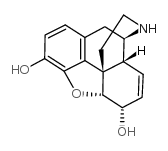A novel opioid structure which accepts protonated as well as non-protonated nitrogen: a family of pure, delta receptor selective antagonists.
A Z Rónai, J Botyánszki, J Hepp, K Medzihradszky
文献索引:Life Sci. 50(18) , 1371-8, (1992)
全文:HTML全文
摘要
Conventional opioids including opioid peptides require an "opioid" nitrogen which exists in protonated state while interacting with the receptor. In the present paper we demonstrate that the Tyr-Pro-Gly-Phe-Leu-Thr hexapeptide sequence accepts N-terminal substituents such as N-t-Boc, N-phenylacetyl and N-diphenylacetyl where the N cannot become protonated, as well as "traditional" substitutions such as N,N-diallyl, where protonation is likely under physiological conditions. The opioid peptides bearing these substituents are pure antagonists of medium affinity (Ke values in the mouse vas deferens bioassay against [Met5]-enkephalin are in the 3 x 10(-7)-4 x 10(-6) M range) with a high delta receptor preference (50-350-fold delta over mu selectivity ratios).
相关化合物
| 结构式 | 名称/CAS号 | 分子式 | 全部文献 |
|---|---|---|---|
 |
去甲吗啡
CAS:466-97-7 |
C16H17NO3 |
|
Analysis of unconjugated morphine, codeine, normorphine and ...
1995-01-01 [J. Pharm. Biomed. Anal. 13(1) , 27-32, (1995)] |
|
Fatal and severe codeine intoxication in 3-year-old twins--i...
2009-09-01 [Int. J. Legal Med. 123(5) , 387-94, (2009)] |
|
Ethanol interference with morphine metabolism in isolated gu...
1996-09-01 [Pharmacol. Toxicol. 79(3) , 114-9, (1996)] |
|
Serum and cerebrospinal fluid morphine pharmacokinetics afte...
2007-09-01 [Eur. J. Clin. Pharmacol. 63(9) , 837-42, (2007)] |
|
Partial and full agonism in endomorphin derivatives: compari...
2006-06-01 [Peptides 27(6) , 1507-13, (2006)] |